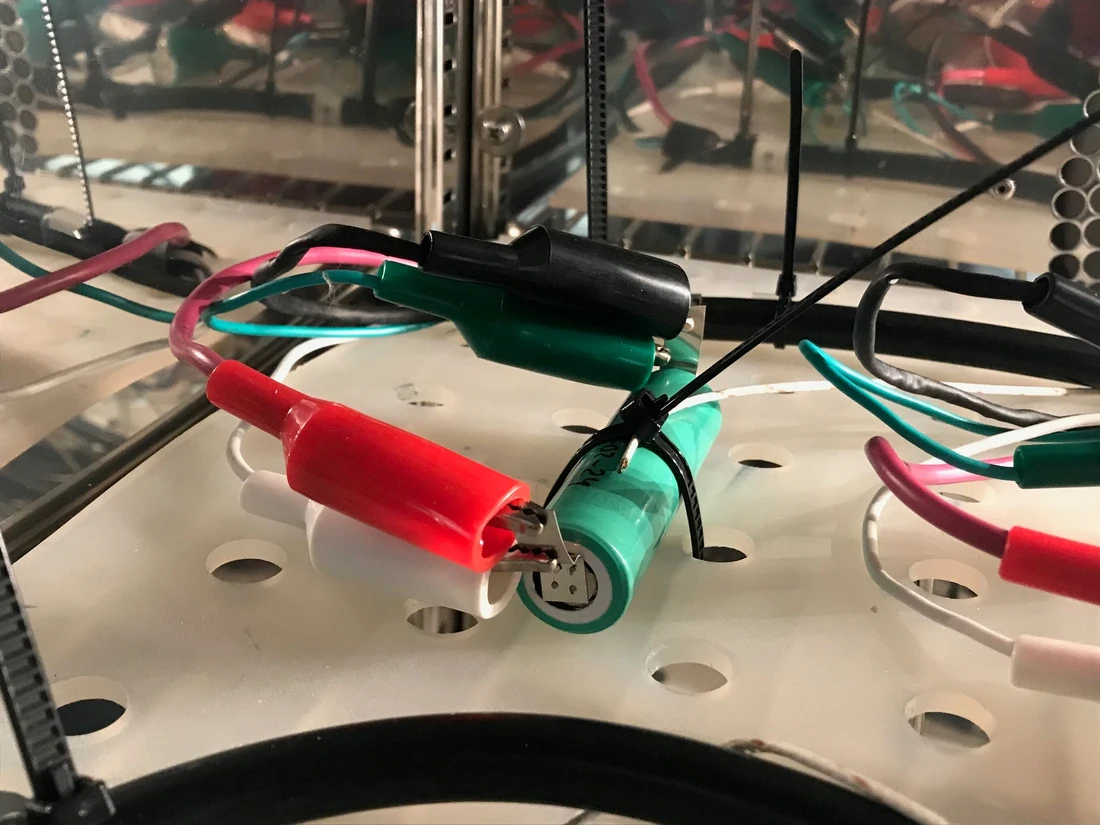Research on fast and high-precision float current technology as an alternative to conventional calendar ageing tests on lithium ion cells and research on fast parameterizable ageing prognosis simulations
Project term: 01.06.2020 - 31.05.2024
Focus:
- Development of a low-cost & high precision float current measurement system
- Comparison of float and check-up method on industrial cells
- Development of time-efficient evaluation and parameterization routines
Summary:
This research project is in the context of the shift from internal combustion engines to electro mobility. The pressure to develop low-cost, innovative and, above all, long-lasting battery cells with higher energy and power densities is continuously increasing. In particular, degradation and, of course, the rapid measurement of degradation are not sufficiently covered scientifically, yet. The problem here is that irreversible ageing, which is relevant for life-cycle predictions, is superimposed by significant reversible effects, especially at the beginning. Furthermore, classical ageing determination methods using capacity tests are very time-consuming, as the measurement under normal conditions takes months to years. This makes testing more prone to errors, very complex and influenced by many fluctuating boundary conditions.
An alternative method is to be fundamentally developed in this project with the so-called float current method. Therefore, the cell is kept in a constant voltage phase at a voltage and the current is measured with a high resolution. In the transient phase, polarisation effects and effects caused by concentration differences are compensated. The current signal then reaches a steady-state. This could be assigned exemplarily in a publication of the irreversible aging by the applicants. In this proposal, the method is to be methodically researched and validated on other cell types. For this purpose, the hardware needs to be optimized especially for this application in order to enable a sensible regulation, a favourable measurement and thus many measurements. With this knowledge, the understanding of balancing processes in the battery and ageing processes can then be understood with the help of suitable modelling. Only this combination makes it possible to achieve improved and, above all, faster lifetime predictions. The measurement methodology should be applied in such a way that a quick parameterization within 4-6 weeks of a lifetime model is possible and thus at least 5 years of battery use can be reliably predicted.
Another application to be investigated is the determination of the stability of battery cells. The float current is measured in a steady state with a gradual increase in temperature. The cell is particularly stable in the long term if the float current has not increased according to a temperature profile at the reference temperature. If, on the other hand, it does not remain stable, the previous temperature profile influences ageing and a path dependency is present. This is of particular importance for modelling and thus for the lifetime prognosis. Such a dependency of the battery behaviour on the prehistory has only been rudimentarily investigated in the scientific community so far.

Relevant literature:
- M. Azzam, C. Endisch, M. Lewerenz, Evaluating the Aging-Induced Voltage Slippery as Cause for Float Currents of Lithium-ion Cells, Batteries 10(1) (2024) 3. https://doi.org/10.3390/batteries10010003.
- M. Azzam, M. Ehrensberger, R. Scheuer, C. Endisch, M. Lewerenz, Long-Term Self-Discharge Measurements and Modelling for Various Cell Types and Cell Potentials, Energies 16(9) (2023) 3889. https://doi.org/10.3390/en16093889.
- M. Theiler, C. Endisch and M. Lewerenz, Float Current Analysis for Fast Calendar Aging Assessment of 18650 Li(NiCoAl)O2/Graphite Cells, Batteries 7 (2021) 22. https://doi.org/10.3390/batteries7020022.
- M. Lewerenz, J. Münnix, J. Schmalstieg, S. Käbitz, M. Knips, A. Warnecke, D.U. Sauer, New method evaluating currents keeping the voltage constant for fast and high resolved measurement of Arrhenius relation and capacity fade, J. Power Sources 353 (2017) 144–151. https://doi:10.1016/j.jpowsour.2017.03.136.
Contact
Dr. Meinert Lewerenz
Phone: +49 841 9348-6507
Room: S421
E-Mail: Meinert.Lewerenz@thi.de
Moritz Ehrensberger, M.Sc.
Phone: +49 841 9348-6448
E-Mail: Moritz.Ehrensberger@thi.de
Mohamed Azzam, M.Sc.
Phone: +49 841 9348-5189
E-Mail: Mohamed.Azzam@thi.de
Project partner

Funding
This project is funded by the German Research Foundation (project number 440701024).





![[Translate to English:] Logo Akkreditierungsrat: Systemakkreditiert](/fileadmin/_processed_/2/8/csm_AR-Siegel_Systemakkreditierung_bc4ea3377d.webp)








![[Translate to English:] Logo IHK Ausbildungsbetrieb 2023](/fileadmin/_processed_/6/0/csm_IHK_Ausbildungsbetrieb_digital_2023_6850f47537.webp)


